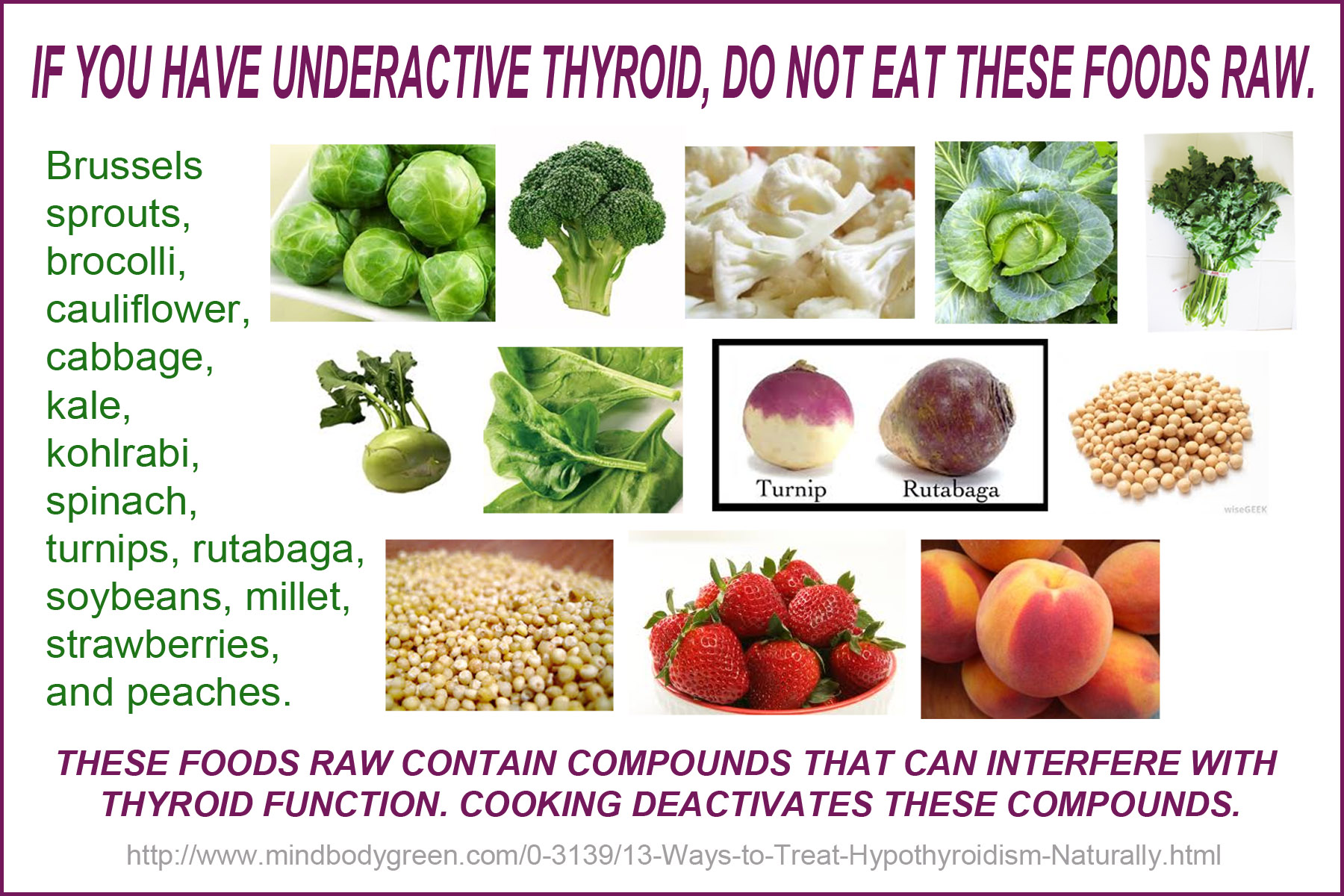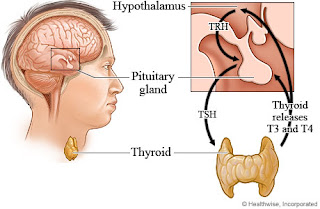THYROID
THYROID GLAND
a ductless gland in the neck which secretes hormones regulating growth and development through the rate of metabolism.
Thyroid gland is completely controlled by TSH ( Thyroid
Stimulating hormone) which is secreted by Anterior pituitary gland which is
then controlled by Hypothalamus factor
- The thyroid gland secretes thyroid hormones including
- 1.Thyroxine (T4)
- 2.Triiodotyrosine (T3)
- 3. Calcitonine which primarily influence the metabolic rate and protein synthesis
THYROID HORMONES
The primary function of
thyroid gland is production of iodine
containing thyroid hormones
Thyroxine( T4) is a
pro hormone of Triiodothyroxine (T3) are tyro sine based hormones
THYROXINE - is the major form of thyroid hormones in the blood which has
a longer life than T3
T4 is then converted to T3
Both of these hormones are
partially composed of Iodine as one of the important element of these hormones
The thyroid gland also
produces the hormone Calcitonin, which helps regulate blood calcium levels.
A deficiency of iodine leads to decreased
production of T3 and T4 hormones which
leads to many diseases and disorders
THYROID DISEASES AND DISORDERS
Any dysfunction of the
thyroid gland leads to many diseases and disorders
The
most common thyroid
problems involve abnormal production of thyroid
hormones. Too much thyroid hormone results in a condition known as hyperthyroidism. Insufficient hormone
production leads to hypothyroidism.
the
effects can be unpleasant , most thyroid
problems can be managed well if properly taken
care and treated.
Hypothyroidism : Since
your body's energy production requires certain amounts of thyroid hormones, a
drop in hormone production leads to lower energy levels
This can occur in
several ways one of the common is :
Hashimoto's thyroiditis : In this autoimmune disorder, the body attacks thyroid tissue. The tissue eventually
dies and stops producing hormones.
Untreated
for long periods of time can lead to severe problems.
1. Poor ability to tolerate
cold
2. a feeling of tiredness,
3. constipation,
4. depression,
5. weight gain.
Occasionally there may be
swelling of the front part of the neck due to goitre.
Untreated hypothyroidism
during pregnancy can lead to delays in growth and intellectual development in the baby, which is called cretinism
Too little iodine in the diet is the most common cause of Hypothyroidism
Also it is treated with a tablet of
levothyroxine the dose is later adjusted according to symptoms and levels of thyroxine and TSH

PREVENTION AND CURE OF
HYPOTHYROIDISM THROUGH DIET
Consumption of
recommended levels of iodine given by the expert commitee i.e
For man/women : 150 mcg/day
For Pregnant women : 220
mcg/day
For Lactating women : 290 mcg/day
As mentioned above the
common cause of hypothyroidism is iodine deficiency in such cases using iodized salt or iodine-enriched foods can be
beneficial
If occured can be
controlled by avoiding Goitrogenous food

FOODS TO EAT
According to one of the
classification thyroxine hormone is an aminoacid derivative so protein rich diet
along with other healthy foods are helpful during the treatment of
hypothyroidism
Nutrient-rich foods that improve your health may
also benefit your thyroid gland. Certain compounds and supplements may help as
well. These include:
Antioxidant-rich fruits and vegetables
Blueberries, tomatoes, bell peppers, and other
foods rich in antioxidants can improve overall health and benefit the thyroid
gland. Eating foods high in B vitamins, like whole grains, may also help.
Selenium-Tiny amounts of selenium are needed
for the enzymes that make thyroid hormones to work properly. Eating
selenium-rich foods, such as sunflower seeds or Brazil nuts, can be beneficial.
Tyrosine
This amino acid is used by
the thyroid gland to produce T3 and T4. Good sources of tyrosine are meats,
dairy, and legumes.Hyperthyroidism
is due to an overproduction of thyroid
hormones, this condition can occur in several ways.
Toxic
adenomas: Nodules develop in the
thyroid gland and begin to secrete thyroid hormones which can change or upset
body’s chemical balance.
Subacute
thyroiditis: Inflammation of
the thyroid that causes the gland to "leak" excess hormones,
resulting in temporary hyperthyroidism that generally lasts a few weeks but may
persist for months
.

SYMPTOMS OF HYPERTHYROID INCLUDES :-
1. Irritability
2. muscle weakness
3. sleeping problems,
4. fast heartbeat,
5. heat intolerance,
6. diarrhea,
7. enlargement of the
thyroid,
8. weight loss
PREVENTION AND CURE OF
HYPERTHYROIDISM THROUGH DIET
DIETARY RECOMMENDATIONS
Avoid foods high in
iodine, such as seafood, iodized salt, eggs, curd, and milk.
Eat cruciferous vegetables like cabbage, cauliflower and broccoli, preferably raw.
Green leafy vegetables like mustard greens, spinach and kale are believed to depress the function of your thyroid.
Consume flax seed oil and ground flax seeds, as they are ideal sources for Omega 3 fatty acids Vitamin D from eggs, salmon, mackerel and mushrooms.
Soybeans and soy products can help an over-stimulated thyroid.
Whole grains like millet and brown rice, combined with nuts and seeds are rich sources of zinc, an important element necessary for the body functions that might be depleted due to hyperthyroidism.
Take a high potency B-complex supplement daily to replenish the B vitamins used up for increased metabolism

GOITER
The most common cause of goiters worldwide is a lack of iodine in the diet. In the United States, where the use of iodized salt is common, a goiter is more often due to the over- or underproduction of thyroid hormones or to nodules that develop in the gland itself.
Treatment depends on the size of the goiter, your symptoms and the underlying cause. Small goiters that aren't noticeable and don't cause problems usually don't need treatment..
DIETARY RECOMMENDATIONS ( ARE AS SAME OF) DEPENDS WITH THE
PRESENCE OF HYPOTHYROIDISM OR HYPERTHYROIDISM
ACCORDING TO THE SYMPTOMS
- SAMREEN
NAHID
(B.Sc) Applied
Nutrition- 2nd Year
St
Ann's college for Women.



Good info 👌👍
ReplyDeleteVery informative
ReplyDeleteVery informative
DeleteWeakness and weight gain are most common symptoms. To reduce weakness thyroid supplements are effective.
ReplyDelete